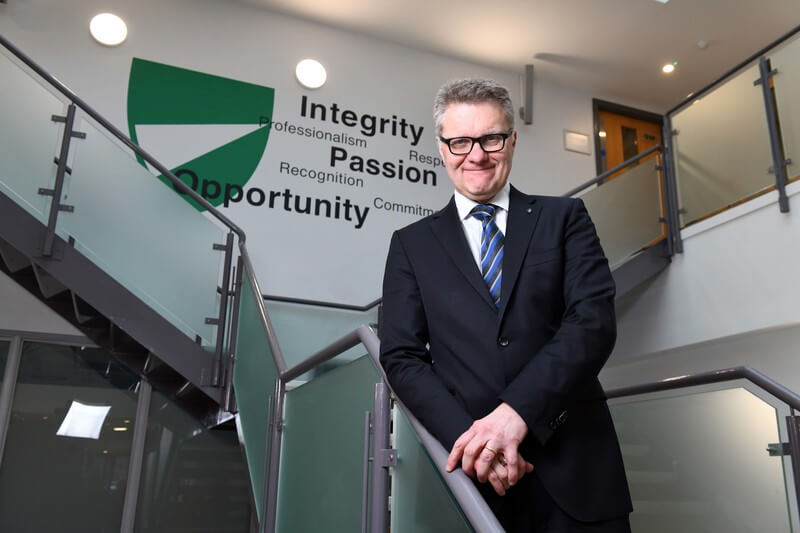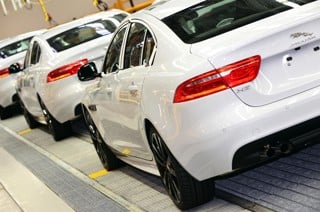With ongoing challenges such as inflationary pressures and market volatility, Vertu Motors’ Robert Forrester outlined to AM how the company plans to sustain first-half momentum, manage costs, and expand its presence in both the electric vehicle and used car markets, all while balancing this growth with shareholder returns.
Vertu Motors saw a 2.9% increase in total group revenue in the six months to August 31 with strong growth in aftersales. Can you outline the key factors behind the robust performance?
We've got more technicians than we've ever had, which is obviously helpful because it gives you more productive hours and we've had no shortage of customers, that's for sure.
With ongoing challenges such as inflationary pressures and market volatility, Vertu Motors’ Robert Forrester outlined to AM how the company plans to sustain first-half momentum, manage costs, and expand its presence in both the electric vehicle and used car markets, all while balancing this growth with shareholder returns.
Vertu Motors saw a 2.9% increase in total group revenue in the six months to August 31 with strong growth in aftersales. Can you outline the key factors behind the robust performance?
We've got more technicians than we've ever had, which is obviously helpful because it gives you more productive hours and we've had no shortage of customers, that's for sure.
We've also used technology that has freed up people to sell more through the vehicle health check process, the pay-later product where people can do further spend which is an in-house product and the self-service check-ins are creating space for people to increase customer experience levels.
Our customer experience levels in service are excellent, to be honest, across the group, allowing us to spend time with customers and sell them the work we've identified. I think these are the main factors contributing to our success. For instance, we grew tyre sales by 19.4%, even though the tyre market is actually down.
How do you plan to sustain that momentum?
We'll continue to do what we do. We will make sure we're running the dealerships tightly and ensuring that they are increasing. There's still room to improve the selling, still room to improve the tightness of the vehicle health check process, and we have some divisions that are missing technicians.
Looking at profitability, you say you expect it to improve in the second half, despite increased costs due to inflation. What specific measures are you implementing to manage those costs and to increase profit?
I think profits will improve because used cars last year saw massive price deflation, which cost the industry a lot of money in lost margin. I don't think that will be the case this year. I think used car values are robust, and prices are starting to rise.
We're in a much different position than we were last year regarding cost management. It's the job of management to be nimble with costs, even though it’s quite difficult at the moment when costs are coming from the national minimum wage and a government that seems to consider business as a pot for money.
We have plans to use technology to make our people more productive, and we'll continue to assess where we can go on costs.
Regarding the used vehicle market, you achieved a 3.9% growth in sales volumes and increased gross margins to 7.3%. How did you manage that?
We have AI-based technology that reprices 75% of retail cars every day. This has certainly helped ensure cars are priced right.
Our average selling price was £877 lower than last year due to price corrections in Q4, making used cars more affordable and helping increase volumes.
Our sales process is also much more robust than it was two years ago, and our mystery shop scores are now excellent. We've done a lot of work on training our sales process, which has certainly helped.
Turning to new vehicle sales, while volumes declined by 5.9%, you significantly outpaced the overall market's 11.2% drop. What specific actions did Vertu take to secure those market share gains?
An important stat is that, during that period, UK retail sales in battery electric vehicles (BEV) fell by 7%, while we grew by 10.9%. That outperformance in electric vehicles is a big part of why we outperformed on new retail sales. We've also had significant growth; for example, we doubled BEV sales in September.
What strategies are you employing to navigate market volatility caused by government regulations regarding the transition to battery electric vehicles?
We've been at the forefront of raising public awareness and lobbying to educate the government on the impact of their policies. In fairness, the current government's policies are largely inherited from the previous administration.
Secondly, we've focused on growing our BEV sales, which we've done very successfully. Lastly, we’re strengthening our partnerships with Chinese manufacturers, who lead the global BEV market.
You mentioned a focus on partnerships with Chinese manufacturers. Have you made any plans for new partnerships?
Yes, we plan to have five Leapmotor outlets by Christmas.
What role will these Chinese manufacturing partnerships play in your overall growth strategy?
We need to have more partnerships with Chinese manufacturers, especially since the government has indicated they are not in the mood for imposing big tariffs on Chinese cars.
We might be the only major Western economy without these tariffs, so I suspect the Chinese will take market share. However, they've got a lot of work to do to grow their brands, as, with the exception of MG, they're not well-known here.
Regarding Motability sales, you reported a 23% rise there. What role do you see that segment playing in your overall growth strategy?
I suspect Motability sales will moderate. I don’t think it will continue to grow at 23% since the support levels are coming down, and I believe it will start to tail off.
You've announced a further £3 million share buyback programme alongside an increased interim dividend of 90 pence per share. How do these shareholder returns fit within your broader capital allocation strategy?
Our capital allocation strategy covers four components: organic growth, inorganic growth (acquisitions or startups), dividends, and share buybacks. We look at the whole gamut of those four and have strong principles guiding our decisions.
With low gearing at 23%, we think we can effectively manage all these areas while continuing to grow the business organically and inorganically, along with higher dividends and share buyback programmes.
How do you balance the share buyback program with the acquisition strategy?
We believe we have enough capacity to do both. It's important to continue scaling our operations.
What is the size of the war chest for acquisitions?
We don't really look at it that way. It depends on what we are buying and the depth of capacity that would come with it although it’s clearly considerable.
You’ve also made progress in surplus property disposals. How did these contribute to cash flow and profitability in the first half?
Not much, actually; about £800,000 in cash. However, we expect that to be much bigger in the second half. We just completed another disposal this week, which was around £1.7m, and we hope for a full-year cash inflow of about £9.6m.
What are your key priorities for driving growth in the second half of the year?
It's essential to have the right management in place. We need to stick to the basics, ensuring that when a customer comes in, we efficiently sell them a car and manage our service department.
What motivated the decision to rebrand all the dealerships under the Vertu name?
There are a number of reasons. We're now one of six super groups in the UK, and we need to compete with those groups, many of which have one brand. We had three major retail brands, and the distinction between volume and premium dealerships is outdated.
We’ve got MG selling £65,000 cars. We've got Ford selling £50,000 cars. What is a premium and a volume dealership in the new world? Very difficult to differentiate.
The manufacturers were keen on the Vertu brand, which is more modern. We think this will lead to significant cost savings and efficiency, simplifying our business under one brand.
What are your priorities for the next 12 to 18 months?
To continue growing the business and ensuring it is known for operational excellence, with fantastic management and a great workforce. We also need to manage the cost pressures that will inevitably come, largely from the government.
It’s not without its challenges, but I believe we’re in a good position.
What do you expect to occur in the October 30th Budget?
I don't speculate on things that haven't happened. But as I mentioned, we'll be nimble and flexible. We’ve dealt with a lot in the past, and we will manage whatever comes our way.
Login to continue reading
Or register with AM-online to keep up to date with the latest UK automotive retail industry news and insight.




















Login to comment
Comments
No comments have been made yet.